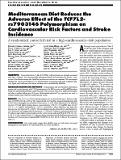Por favor, use este identificador para citar o enlazar a este item:
http://hdl.handle.net/10261/247823COMPARTIR / EXPORTAR:
 SHARE SHARE
 CORE
BASE CORE
BASE
|
|
| Visualizar otros formatos: MARC | Dublin Core | RDF | ORE | MODS | METS | DIDL | DATACITE | |

| Título: | Mediterranean diet reduces the adverse effect of the TCF7L2-rs7903146 polymorphism on cardiovascular risk factors and stroke incidence: A randomized controlled trial in a high-cardiovascular-risk population |
Autor: | Corella, Dolores; Carrasco, Paula; Sorlí, José V.; Estruch, Ramón; Rico-Sanz, Jesús; Martínez-González, Miguel Ángel; Salas-Salvadó, Jordi; Covas, María Isabel; Coltell, Óscar; Arós, Fernando; Lapetra, José; Serra-Majem, Lluís; Ruiz-Gutiérrez, Valentina CSIC ; Wärnberg, Julia CSIC ORCID; Fiol, Miquel; Pintó, Xavier; Ortega-Azorín, Carolina; Muñoz, Miguel Ángel; Martínez, J. Alfredo; Gómez-Gracia, Enrique; González, José Ignacio; Ros, Emilio; Ordovás, José M. | Fecha de publicación: | nov-2013 | Editor: | American Diabetes Association | Citación: | Diabetes Care 36(11): 3803-3811 (2013) | Resumen: | [Objetive]: Transcription factor 7-like 2 (TCF7L2) polymorphisms are strongly associated with type 2 diabetes, but controversially with plasma lipids and cardiovascular disease. Interactions of the Mediterranean diet (MedDiet) on these associations are unknown. We investigated whether the TCF7L2-rs7903146 (C>T) polymorphism associations with type 2 diabetes, glucose, lipids, and cardiovascular disease incidence were modulated by MedDiet. [Research Design and Methods]: A randomized trial (two MedDiet intervention groups and a control group) with 7,018 participants in the PREvención con DIetaMEDiterránea study was undertaken and major cardiovascular events assessed. Data were analyzed at baseline and after a median follow-up of 4.8 years. Multivariable-adjusted Cox regression was used to estimate hazard ratios (HRs) for cardiovascular events. [Results]: The TCF7L2-rs7903146 polymorphism was associated with type 2 diabetes (odds ratio 1.87 [95% CI 1.62–2.17] for TT compared with CC). MedDiet interacted significantly with rs7903146 on fasting glucose at baseline (P interaction = 0.004). When adherence to the MedDiet was low, TT had higher fasting glucose concentrations (132.3 ± 3.5 mg/dL) than CC+CT (127.3 ± 3.2 mg/dL) individuals (P = 0.001). Nevertheless, when adherence was high, this increase was not observed (P = 0.605). This modulation was also detected for total cholesterol, LDL cholesterol, and triglycerides (P interaction < 0.05 for all). Likewise, in the randomized trial, TT subjects had a higher stroke incidence in the control group (adjusted HR 2.91 [95% CI 1.36–6.19]; P = 0.006 compared with CC), whereas dietary intervention with MedDiet reduced stroke incidence in TT homozygotes (adjusted HR 0.96 [95% CI 0.49–1.87]; P = 0.892 for TT compared with CC). [Conclusions]: Our novel results suggest that MedDiet may not only reduce increased fasting glucose and lipids in TT individuals, but also stroke incidence. |
Descripción: | © 2013 by the American Diabetes Association. | Versión del editor: | http://dx.doi.org/10.2337/dc13-0955 | URI: | http://hdl.handle.net/10261/247823 | DOI: | 10.2337/dc13-0955 | ISSN: | 0149-5992 | E-ISSN: | 1935-5548 |
| Aparece en las colecciones: | (IG) Artículos |
Ficheros en este ítem:
| Fichero | Descripción | Tamaño | Formato | |
|---|---|---|---|---|
| Mediterranean_Corella_PV_Art2013.pdf | 656,7 kB | Adobe PDF |  Visualizar/Abrir |
CORE Recommender
PubMed Central
Citations
53
checked on 17-abr-2024
SCOPUSTM
Citations
116
checked on 24-abr-2024
WEB OF SCIENCETM
Citations
94
checked on 24-feb-2024
Page view(s)
52
checked on 27-abr-2024
Download(s)
46
checked on 27-abr-2024

